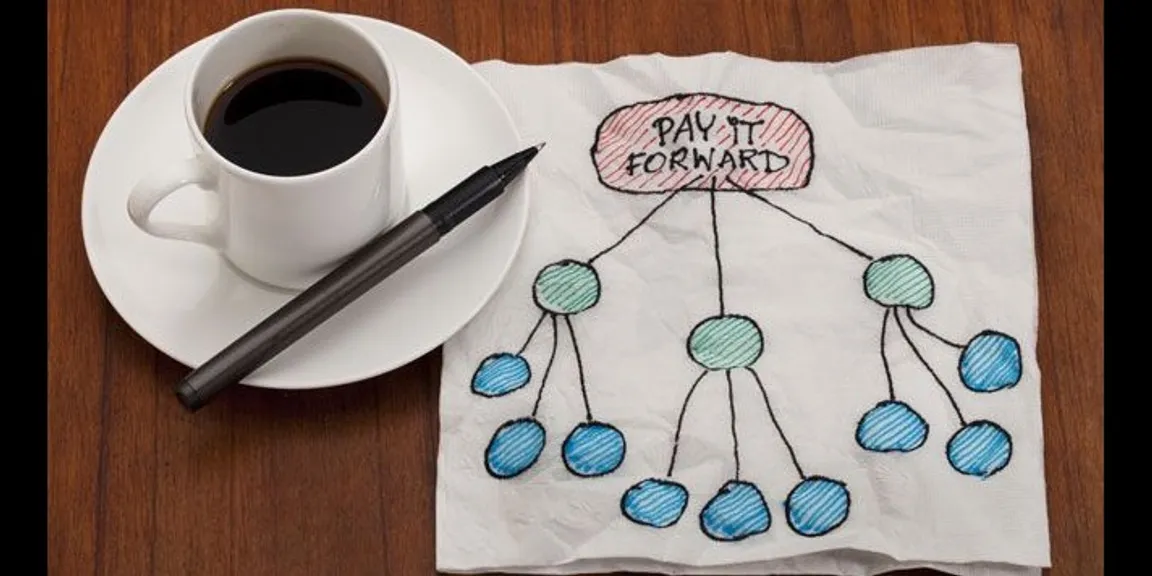

Pay-it-forward paradox: The more you give, the more you receive
Quotes from a few of the wonderful design thinkers we have had the opportunity of meeting
Ever noticed how the busiest of people are often the ones that find time more easily than others? It is about making the time versus having the time!
When you make time despite busy schedules and packed days to share your experience and perspectives it helps so many people, definitely more than you could individually imagine. In the process though, you get so much back, more than you could individually imagine. And, I am not just talking about the ego boost you get from your audience, it is the whole process. Deciding what to share allows you to spend time reflecting, perhaps even researching. You learn and remind yourself of what you knew and could have forgotten. The prep certainly helps you articulate and verbalize your thoughts. When you hear your audiences’ perspectives, another learning opportunity. When you get asked a question you couldn’t answer at first, yeah, another learning opportunity. It is the gift that keeps on giving. You very quickly see that making the time to share your thoughts and experiences is a really good way to learn.

We are crazy biased towards design thinking as a mind set and a process to innovate. We are practitioners and have used design thinking in our own jobs to innovate and are able to share war stories, trials and tribulations from our experiences. In our very first year we took on the arduous task of putting together the Design Thinking Summit. The first draft was a vision more than a plan. Here’s what was serendipitous… as we shared our vision, many good people came to support our vision.
NSRCEL- IIM Bangalore, Intuit, iSpirit and YourStory gave us their support. Many friends and fellow practitioners gave us their time, ideas and mentorship.
It was truly inspiring and motivating to see so many people pay it forward, we were blessed to have that kind of support. Design Thinking still being at a stage where it's kicking off the ground, it could do with all the awareness and support it can get.
Paying-it-forward is wonderful but then you imagine doing that for a bunch of people you have no vested interest in, it is pure humility.
The magnanimity with which they approach knowledge sharing is humbling. There is recognition of the notion that there are millions out there waiting to interact and hear their encouraging and inspirational stories. We asked a few design do-gooders we have had the honour of working with about why they work pro-bono. Here is what they had to say… we are indeed grateful to all the pay-it-forward individuals, makes us want to do more!
“One of the most wonderful experiences in life is to see an idea evolve into a feature or a product and then into business. There are a great many ideas out there that are ready to take this journey. Helping others navigate and experience this journey is what addressing larger audiences is all about”- Tridib Roy Chowdhury, GM | Sr Director Products, Adobe
“I do it to pay it forward to peers, practitioners, designers & society at large for better ways to solve problems by design thinking. It is great to be part of something, where it is not driven by the idea of an individual but as a collaborative effort for change.I also get to be part of a platform where I can exchange idea/thoughts/ methodologies and more importantly learn, since there is no single right/wrong way to do design thinking”- Harshit Desai, Design Thinker | Digital Transformation Lead | User Experience Strategist, KPMG India
“Success for individuals or organizations is about what we can do for others as well. I consider it valuable to make the time to share knowledge. Empowering outfits and individuals is just as important. Pensaar’s mission to evangelise and spread design thinking at a nascent stage ties into my belief of sharing is learning”- Venkat Kotamaraju | Chief Strategy Officer, Pensaar
“I see two extremes in the practice of Design Thinking. One pretty serious and offering the best for innovating for better lives. The other is lighter and sometimes belittling the practice. I am a pure play Design thinking practitioner and like to spread the message that for some DT is life changing and for some it betters lives. I have been part of such experiences. It is inspirational! Whether it is pro-bono or not I have been doing this for some years and will continue to do so, to reduce the negativity about design thinking to my best possible ability”- Lakshman P Seshadri | Strategy | Innovation & Design, SAP
“I have always been exploring avenues to supercharge the growth of Indian UX Industry. My time vested in evangelizing design thinking has helped people across the board tackle UX bottlenecks that companies’ encounter in dealing with the perception of mediocrity while competing with international UX firms”- Mohan Krishnaraj | Global Head| Litehouse, Harman Connected Services
“The DT summit helped me realize the cardinal flaw we as innovators tend to make.. immerse ourselves in our idea to an extent that we forget to answer the two fundamental tasks – what problem are you addressing or even better, what is the customer benefit we intend to provide. That was a “Yahoo” moment for me”- Madhavan Sridharan | Senior Principal Scientist, ITC Limited
“For me, sharing is an important step in my learning process. It enables me to learn much more about the thing I already knew. It would also enable to share my experience to others, who could learn from the mistakes I made and experiences that I have gathered. I also believe in this philosophy- After all, life is about the people you meet and things you create with them”- Yeswanth Swami | Software Engineer, FourthLion Technologies
The joy in knowing that that they are changing lives is what makes evangelizing the methodology so important. Also, it triggers a beautiful snowball effect of only inspiring others to do the same.





